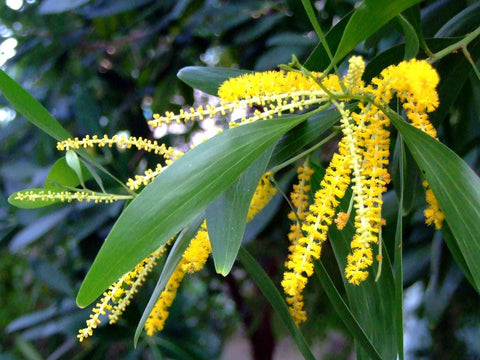A medium to large tree to 30 m tall, native to northern Australia, Indonesia, and Papua New Guinea with attractive, sickle-shaped phyllodes (leaves that are actually not leaves but widened leaf stalks) and yellow, bottle-brush-like flowers in great profusion. Besides being grown as a robust ornamental and shade tree it also makes good firewood, charcoal and pulp and yields tannins and gum that are commercially exploited. Wood is also used for furniture and other purposes. Seeds should briefly be immersed in boiling water before sowing.Count: ~ 5
Sun Exposure Full sun from an early age Light shade when young Frost Tolerance Severe Water Requirements Moderate Drought Tolerance Yes Wind Tolerance High Tolerance of Coastal Conditions Yes Tags: acacia, auriculiformis, avenue, charcoal, child and pet-friendly, dark wood, earleaf, erosion control, evergreen, fabaceae, fabales, firewood, flowering, forage/fodder, heavy wood, landscaping, large tree, latex, medium tree, nitrogen-fixing, ornamental, ornamental trees, pulp, quick canopy, reddish wood, resin, shade, Acacia senegal Gum Arabic TreeGermination Plant seeds in a good garden soil that is well-drained fertile soil. During growth, use a tutor. The tutor can even be used after growth. Fertilizer can be used once a week during growth. This plant enjoys a sunny spot. Germination takes 15-30 days, it can be longer, don’t get discouraged.Germinating Palm Seeds The following instructions will work for most species.If the seeds appear dry, soak them in warm water for 1-3 days. For sowing, use peat, coco fiber, or a similar medium. It should be moist but not wet. Take a fistful. If you can just squeeze a couple of drops of water from it, then it is about right. If you can squeeze more, then it is too wet. If too dry, add a little water and try again. Mix the seeds with the moist compost and place them into a clear plastic (Ziploc) bag, label with species name and date, and seal.No light is required for germination. Tropical species such as Licuala, Bismarckia, or Cyrtostachys require heat, around 30°C/90°F. Temperate species such as Trachycarpus, Ceroxylon, or Parajubaea will germinate at lower temperatures, and heat may actually prevent germination. You may want to check the species descriptions for individual requirements.Check weekly for signs of activity by looking for white roots through the plastic. Ensure that the medium does not dry out. The seeds can take anywhere from 2 weeks to 2 years (or more) to germinate; however, most will sprout after 4-6 weeks.After the seeds have sprouted, plant each in a tall, narrow pot using a well-drained medium, label, and place in ample light, but not in full sun. Aim to keep the soil moist (but not wet) at all times. Feed and repot as required.More information can be found in the comments on the species pages. We also recommend consulting one of the many books on palms available through this website, as well as articles on the internet:
Sun Exposure Full sun from an early age Light shade when young Frost Tolerance Severe Water Requirements Moderate Drought Tolerance Yes Wind Tolerance High Tolerance of Coastal Conditions Yes Tags: acacia, auriculiformis, avenue, charcoal, child and pet-friendly, dark wood, earleaf, erosion control, evergreen, fabaceae, fabales, firewood, flowering, forage/fodder, heavy wood, landscaping, large tree, latex, medium tree, nitrogen-fixing, ornamental, ornamental trees, pulp, quick canopy, reddish wood, resin, shade, Acacia senegal Gum Arabic TreeGermination Plant seeds in a good garden soil that is well-drained fertile soil. During growth, use a tutor. The tutor can even be used after growth. Fertilizer can be used once a week during growth. This plant enjoys a sunny spot. Germination takes 15-30 days, it can be longer, don’t get discouraged.Germinating Palm Seeds The following instructions will work for most species.If the seeds appear dry, soak them in warm water for 1-3 days. For sowing, use peat, coco fiber, or a similar medium. It should be moist but not wet. Take a fistful. If you can just squeeze a couple of drops of water from it, then it is about right. If you can squeeze more, then it is too wet. If too dry, add a little water and try again. Mix the seeds with the moist compost and place them into a clear plastic (Ziploc) bag, label with species name and date, and seal.No light is required for germination. Tropical species such as Licuala, Bismarckia, or Cyrtostachys require heat, around 30°C/90°F. Temperate species such as Trachycarpus, Ceroxylon, or Parajubaea will germinate at lower temperatures, and heat may actually prevent germination. You may want to check the species descriptions for individual requirements.Check weekly for signs of activity by looking for white roots through the plastic. Ensure that the medium does not dry out. The seeds can take anywhere from 2 weeks to 2 years (or more) to germinate; however, most will sprout after 4-6 weeks.After the seeds have sprouted, plant each in a tall, narrow pot using a well-drained medium, label, and place in ample light, but not in full sun. Aim to keep the soil moist (but not wet) at all times. Feed and repot as required.More information can be found in the comments on the species pages. We also recommend consulting one of the many books on palms available through this website, as well as articles on the internet:




